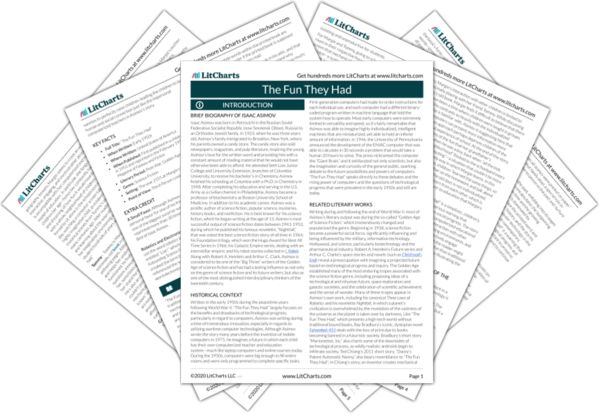Tommy’s book symbolizes the passage of time and the importance of preserving the past. Asimov utilizes the book to demonstrate the ways in which the world of the future differs from that of our present and past. The ancientness of the book is manifested in its physical condition, found in Tommy’s attic, it is old and fragile, and its pages are brittle, yellow, and crinkled. The book, although seemingly worthless and of little value, is extremely special to the children, especially to Margie because she had previously only heard about print books and their use from her grandfather, who heard about them from his grandfather. The children’s computers now hold millions of eBooks (called “telebooks” in the story), and it is unfathomable to them that a print book only holds a single story—making them wonder if people used to throw books away after reading them. The book awakens Margie’s curiosity and imagination as a mysterious, archival object that tells stories about the past and the history of education. Margie’s reading of the book and her new understanding of bygone schools leads her to daydream about the school system of the past that is very different from her own, where there are human teachers and children laugh, learn, and play together. By including the book in the story, Asimov shows how much time has passed and the dramatic social changes that can occur as a result of new technological progress.
Tommy’s Book Quotes in The Fun They Had
Margie even wrote it that night in her diary. On the page headed May 17, 2155, she wrote, “Today Tommy found a real book!”
It was a very old book. Margie’s grandfather once said that when he was a little boy his grandfather told him there was a time all stories were printed on paper.
They turned the pages, which were yellow and crinkly, and it was awfully funny to read words that stood still instead of moving the way they were supposed to—on a screen, you know. And then, when they turned back to the page before, it had the same words on it that it had had when they read it the first time.
“Gee,” said Tommy, “what a waste. When you’re through with the book, you just throw it away, I guess. Our television screen must have had a million books on it, and it’s good for plenty more. I wouldn’t throw it away.”
“School? What’s there to write about school? I hate school. Margie always hated school, but now she hated it more than ever. The mechanical teacher had been giving her test after test in geography and she had been doing worse and worse until her mother had shaken her head sorrowfully and sent for the County Inspector. “
Tommy looked at her with very superior eye. “Because it’s not our kind of school, stupid. This is the old kind of school that they had hundreds and hundreds of years ago.” He added loftily, pronouncing the word carefully, “Centuries ago.”
“A man? How could a man be a teacher?”
“Well, he just told the boys and girls things and gave them homework and asked them questions.”
“A man isn’t smart enough.”
She was thinking about the old schools they had when her grandfather’s grandfather was a little boy. All the kids from the whole neighborhood came, laughing and shouting in the schoolyard, sitting together in the schoolroom, going home together at the end of the day. They learned the same things so they could help one another on the homework and talk about it […] Margie was thinking about how the kids must have loved it in the old days. She was thinking about the fun they had.












